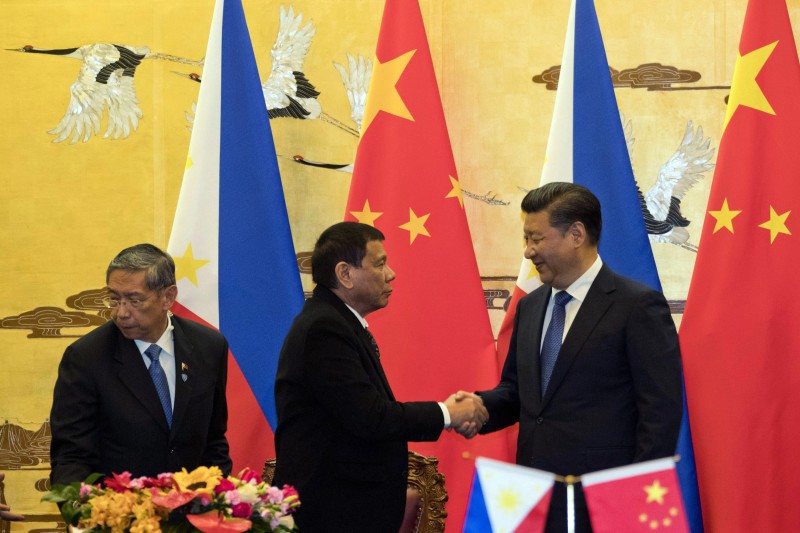
Philippine President Rodrigo Duterte, center, and Chinese President Xi Jinping shake hands after a signing ceremony in Beijing, China, Thursday, Oct. 20, 2016. Duterte was meeting Thursday with Xi in Beijing as part of a charm offensive aimed at seeking trade and support from the Asian giant by setting aside a thorny territorial dispute. (AP Photo/Ng Han Guan, Pool)
If international relations were to be described in the language of courtship, then it would seem that an enamored Philippines rushed headlong into the embrace of a suitor who had been wooing it away from a lover that had, over the years, grown fat and complacent.
We’re talking about China and the diplomatic coup it appeared to score last week when it pulled the Philippines away from a decades-old America-centric orbit into a growing sphere of influence that lay just across the South China Sea. And what better way to seal the relationship than to stage an extravagant ceremony for all the world to see?
That seems to be what happened last week in Beijing’s Great Hall of the People, where President Duterte was accorded arrival honors reserved for world leaders that the Chinese Communist Party holds in the highest regard: a 21-gun salute fired by Howitzer cannons in Tiananmen Square while the Philippine national anthem played, a review of goose-stepping honor guards of the People’s Liberation Army’s ground, air and naval troops, and a crowd of children waving flowers and flaglets.
And when President Xi Jinping and his guest engaged in their bilateral talks, the head of the world’s second largest economy showered billions of dollars worth of benefits on the Philippines—a dowry befitting the new union between the two nations.
The Philippines’ need to improve its infrastructure system is widely known, so China simply went for the country’s most exposed pressure point via $6 billion worth of soft loans that could be used to finance anything from new airports, railways and highways to other big-ticket projects. The state-owned Bank of China invited a number of Filipino companies to participate in a $3-billion credit facility (as if these conglomerates weren’t already awash in cash) to be used for whatever they deemed fit. To top it off, the Chinese government threw in an additional $15 million worth of resources to be used for Mr. Duterte’s war on drugs.
Not to be outdone, and perhaps wanting to show their support for the President, several Filipino firms also signed supply contracts with Chinese companies—deals that would have happened anyway, but the timing for which was adjusted to coincide with the four-day state visit.
All told, some $24 billion worth of financial commitments (some firm deals, but many others less binding memoranda of understanding) were entered into between Filipino and Chinese officials. By any measure, this is a staggering amount for a leader to take home from a state visit, and the President should be congratulated for it.
Almost immediately after receiving gifts from China, Mr. Duterte came out swinging at the United States, sending shock waves throughout the international diplomatic community.
Those who have struggled to explain his stance toward the United States, including some members of his official family, believe that his bellicose language is merely an attempt to extract a better deal for the country from its former colonial master. But it would be good for him to remember that the Philippines has inherent economic and geopolitical strengths that he can leverage upon to win more benefits for his people. The Philippines being a market of over 100 million consumers, companies—whether Chinese, American, or European—will want to, nay, will need to, deal with it.
The physics of international trade dictates that a market with the demographics of the Philippines and its relatively cheap labor, abundant natural resources, and need for foreign goods and services make it too attractive to ignore.
Going forward, the President would also do well to remember a fact that his predecessor may have overlooked: Both China and the United States need us as much as we need them.
If he truly wants a better deal for the Philippines in the international arena, it would be best to play hard to get with all its suitors, and not just with its old and actually somewhat complacent lover.

